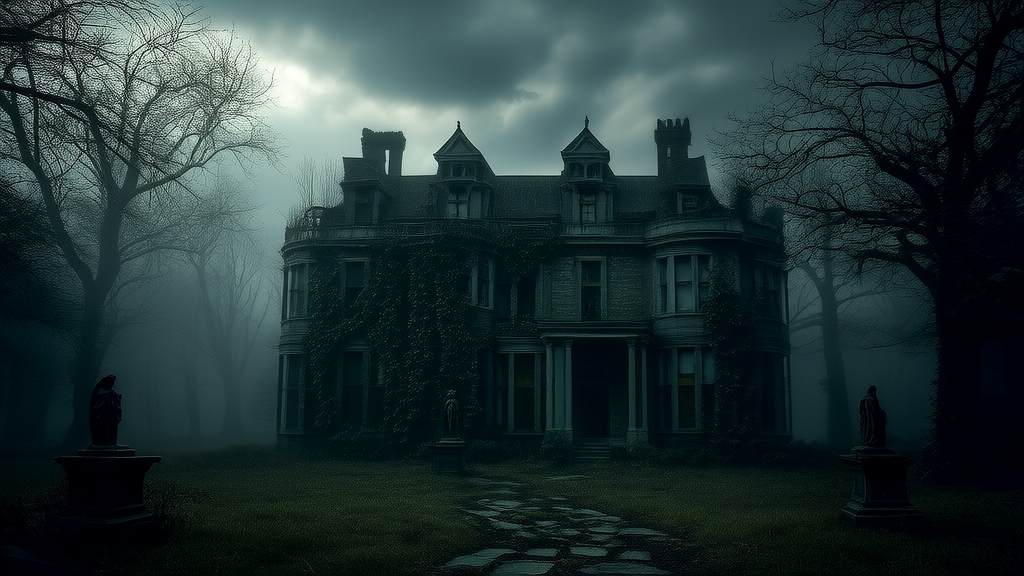🔮 Weird Tales & Urban Legends
The Hollow House and the Artist Who Never Came Back

The old building stood at the edge of town, half-hidden by ivy and time. No one knew exactly when it was built, only that it had been abandoned for decades. Locals whispered about it in hushed tones, calling it "The Hollow House." Children dared each other to approach it, but none ever stayed long enough to find out what lay inside.
One spring evening, a young artist named Elias wandered into the town square, drawn by the strange silence that hung over the area like a forgotten memory. He had come to sketch the old buildings for his latest project, but something about this particular structure called to him. Its windows were dark, its doors warped and creaking as if they had never been opened. The air around it felt different—thicker, almost heavy with something unseen.
Elias approached cautiously, his boots crunching on gravel. As he reached the front steps, a gust of wind blew through the empty lot, carrying with it a faint scent of burnt wood and something sweet, like old roses. He hesitated, then stepped forward. The door groaned as he pushed it open, revealing a dimly lit hallway that seemed to stretch endlessly.
Inside, the air was cool and still, untouched by time. Dust motes floated lazily in the slivers of light that managed to slip through broken panes. The floorboards creaked under his weight, and every sound echoed strangely, as if the walls themselves were listening. He moved deeper, past a grand staircase that spiraled upward into darkness. On the walls, faded paintings of people with hollow eyes watched him from behind cracked frames.
In the main hall, a large clock stood against the far wall, its hands frozen at 3:07. Elias frowned. That was the time he had arrived. He checked his watch—3:07 PM. It didn’t make sense. The clock had to be broken, yet it seemed to hold some kind of strange truth.
As he explored further, he found a study filled with books stacked in perfect rows, their spines cracked and brittle. A desk sat in the center, covered in dust, but there was a single page left open, as if someone had just finished writing. The ink had dried, but the words were not in any language he recognized. They pulsed faintly in the dim light, shifting slightly when he blinked.
A chill ran down his spine. He turned to leave, but the door had vanished. In its place was a tall mirror, reflecting not his face, but a man standing behind him, watching. When he turned, the room was empty. He stumbled back, heart pounding, and found himself in a different part of the house—one he hadn’t seen before.
The walls here were lined with portraits, each one more unsettling than the last. One showed a woman with her eyes closed, another a child with no mouth. All of them stared back, unblinking. At the end of the corridor, a small door stood ajar. Inside was a bedroom, perfectly preserved. A bed sat in the center, sheets smooth and untouched. A music box rested on the nightstand, its melody soft and haunting.
Elias picked it up, and the music began. It was a lullaby he had never heard before, but it felt familiar, as if it had been sung to him in a dream. As the final note faded, the room grew colder. A whisper drifted through the air, not loud, but clear: *You should not have come.*
He ran, not knowing where he was going, but the house twisted around him, shifting like a living thing. Doors led to new rooms, staircases spiraled into nowhere. He saw glimpses of people moving through the halls—some walking, others floating. They never spoke, never looked at him, but he could feel their presence, watching, waiting.
At last, he found an exit. It was a narrow window high on the wall, just big enough to squeeze through. He climbed out, landing in the overgrown yard with a thud. The moment his feet touched the ground, the house behind him seemed to vanish, swallowed by the trees.
Elias sat on the grass, breathing heavily, his mind racing. He looked back, but the building was gone, replaced by an empty field. No sign of it remained. Yet, in his pocket, he found a small key, rusted and cold, with no label or marking. He didn’t know where it belonged, but he felt certain it was important.
That night, he dreamed of the house again. This time, he was inside, standing before the clock. It ticked forward, slowly, deliberately, until it reached 3:07 once more. And as the hands aligned, the mirror behind him reflected not his face—but the face of the man who had been watching him all along.
发布于 en
🔗
相关站点
- AI Blog — AI 趋势与技术新闻